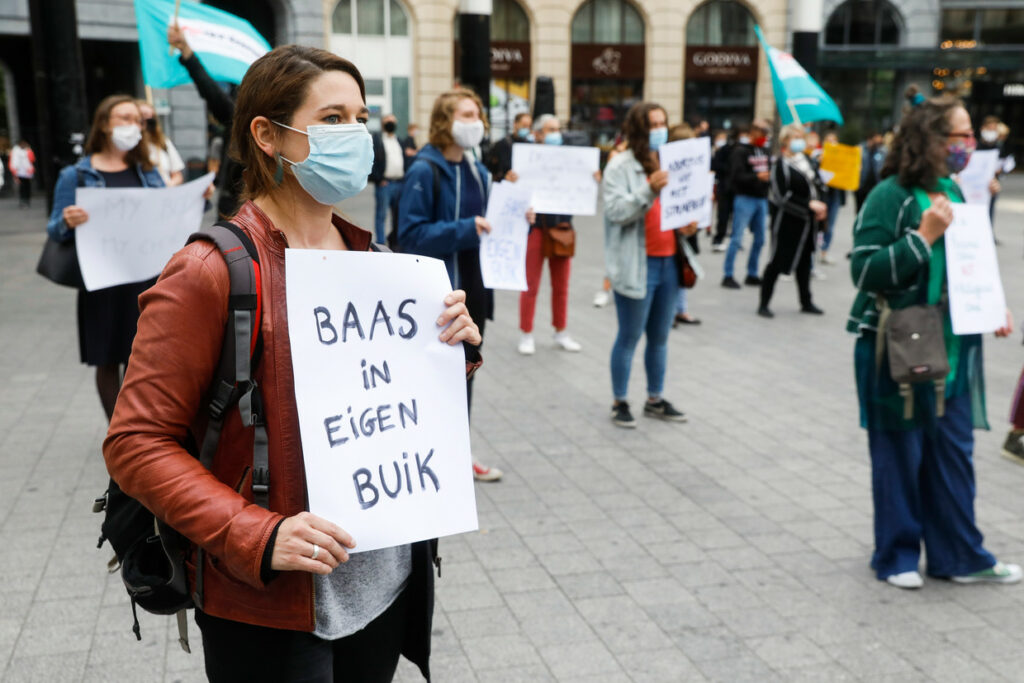Last week, the United States Supreme Court ended the federal right to abortion by overturning the historic 1973 ‘Roe v Wade’ ruling which protected a pregnant woman's freedom to have an abortion.
The ruling means that all US states will now be able to draft their own abortion laws. Within hours of the judgement, several states including Utah, Alabama and Missouri announced most abortions are now illegal, with anti-abortion forces pushing for near-total bans in every state.
Just minutes after the announcement of the overturning was made, Belgian Prime Minister Alexander De Croo reaffirmed that the country will continue to protect reproductive rights. In a Twitter post, De Croo stated that “Belgium will continue to work with other countries to advance sexual and reproductive health rights everywhere.”
Earlier this month, Members of the European Parliament denounced the backsliding of women’s sexual and reproductive health worldwide, including in the US and some EU countries, calling for safe access to abortion.
Yet Europe is not immune from such regressive policies, as was witnessed when Poland controversially reversed abortion rights in 2020; Malta still has a blanket ban. Whilst many Europeans consider abortion rights a given, this is a relatively recent development and access is complicated in many regions.
A landmark ruling
Friday's decision sees the end to almost 50 years of the constitutional right to abortion. In the Supreme Court, which is dominated by conservatives, five of the nine justices voted to end the US federal right to abortion.
The five conservative judges who voted to overturn abortion rights were Samuel Alito, Clarence Thomas, Neil Gorsuch, Brett Kavanaugh and Amy Coney Barrett – of whom the last three were appointed by former Republican US President Donald Trump.
The three more liberal judges in the Court, Stephen Breyer, Sonia Sotomayor and Elena Kagan voted against it; John Roberts, the President of the Court, is also said to have voted against it.
The overturning of Roe v Wade will is likely to affect lower-income women and Black and Hispanic women who lack the resources to travel to obtain an abortion most.
Abortion rights groups have since promised they will fight back in the courts and push President Joe Biden's administration to more actively protect women's reproductive rights.
Closer to home
The US was not the only country eyeing turning back the tide after hard-fought battles for abortion rights. After being the first European country to (partially) decriminalise the procedure in 1932, Poland controversially imposed a near-total ban in 2020.
Other Eastern European countries have also attempted to tighten access to abortion – Hungary’s right-wing government offers financial incentives to hospitals that do not perform abortions.
Related News
- 'Crucial leap forward': Belgium to decriminalise sex work
- Belgium one step closer to allowing euthanasia in cases of dementia
- Ukrainian refugees reignite abortion debate in Poland
In fact, some of the world’s strictest anti-abortion laws can be found in the EU. The overwhelmingly Catholic island-state of Malta has outlawed the procedure entirely, resulting in one American woman vacationing in the country being denied an abortion despite the fetus having a “zero chance” of survival and experiencing severe bleeding.
What about Belgium?
Belgium was one of the last European countries to legalise abortion in 1990, with only Ireland and Northern Ireland legalising it later. The procedure is legal until 12 weeks after conception and must be performed in an abortion clinic or a hospital that offers the service.
Prior to the procedure, a woman must confirm her wish to have an abortion in a counselling session. The abortion is performed at least six days later unless the woman changes her mind in the meantime.
Both surgical and medical abortions are reimbursed to female residents, who only have to pay €3.60 for the procedure; for non-residents, the cost is €500.
Abortion clinics also answer questions on the procedure throughout the country, as do most Family Planning Clinics (Centres de Planning Familial) in Brussels and Wallonia.
Still divisive
Though abortion may be legal in Belgium, not all are in favour of it. 55% of the population believes abortion should be permitted whenever a woman decides she wants one.
24% believe it should be permitted in certain circumstances, for instance if a woman has been raped. 6% think abortion should only be allowed when the life of the mother is in danger; 3% believe abortion should never be permitted.

